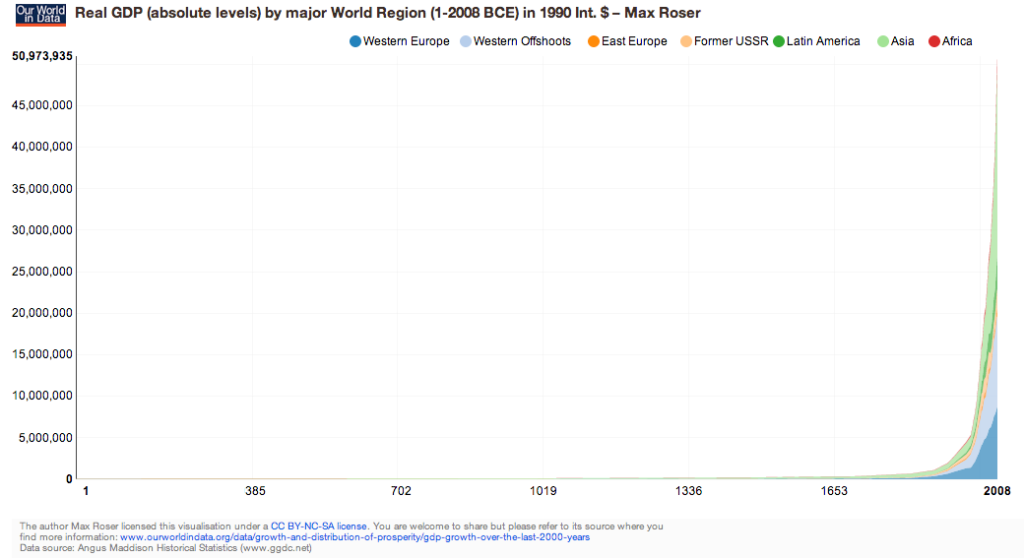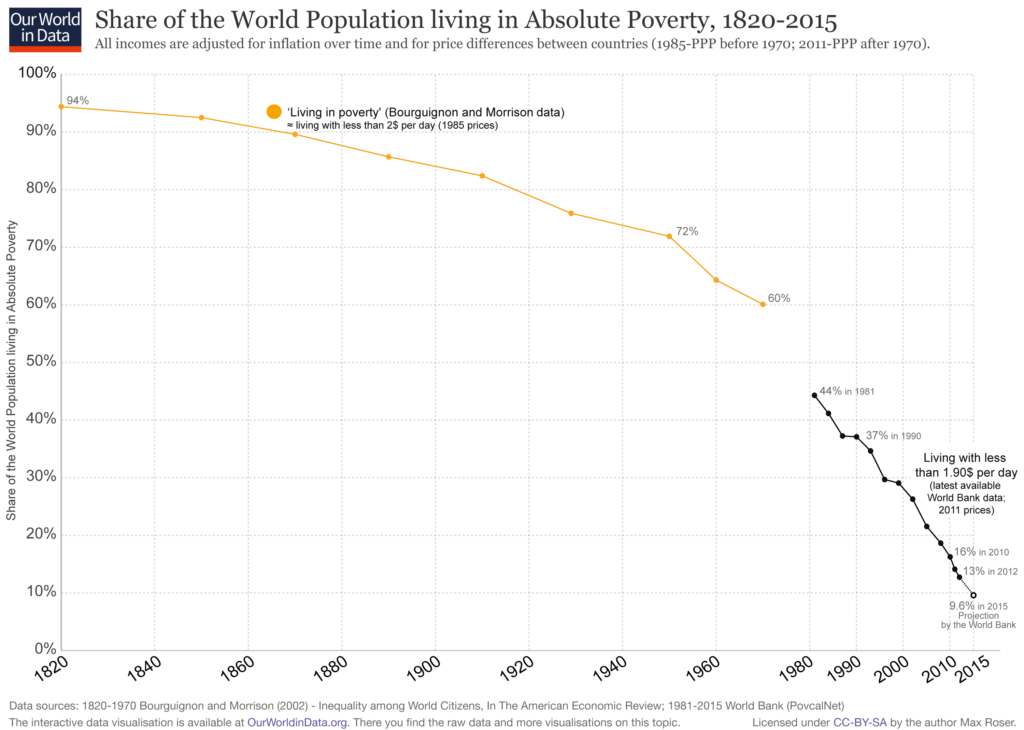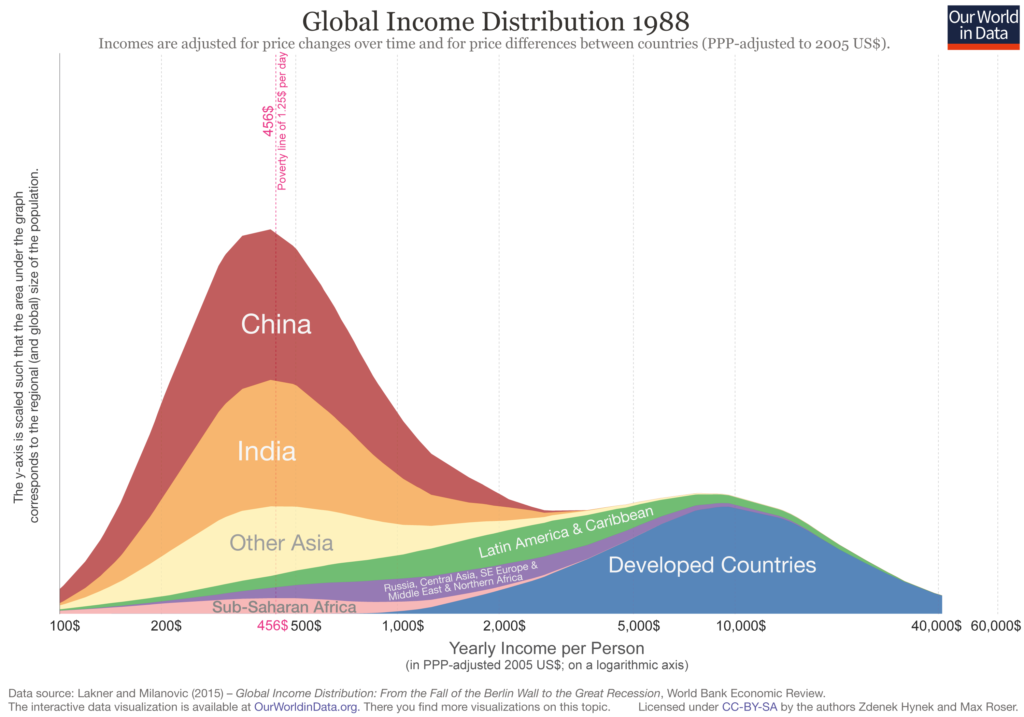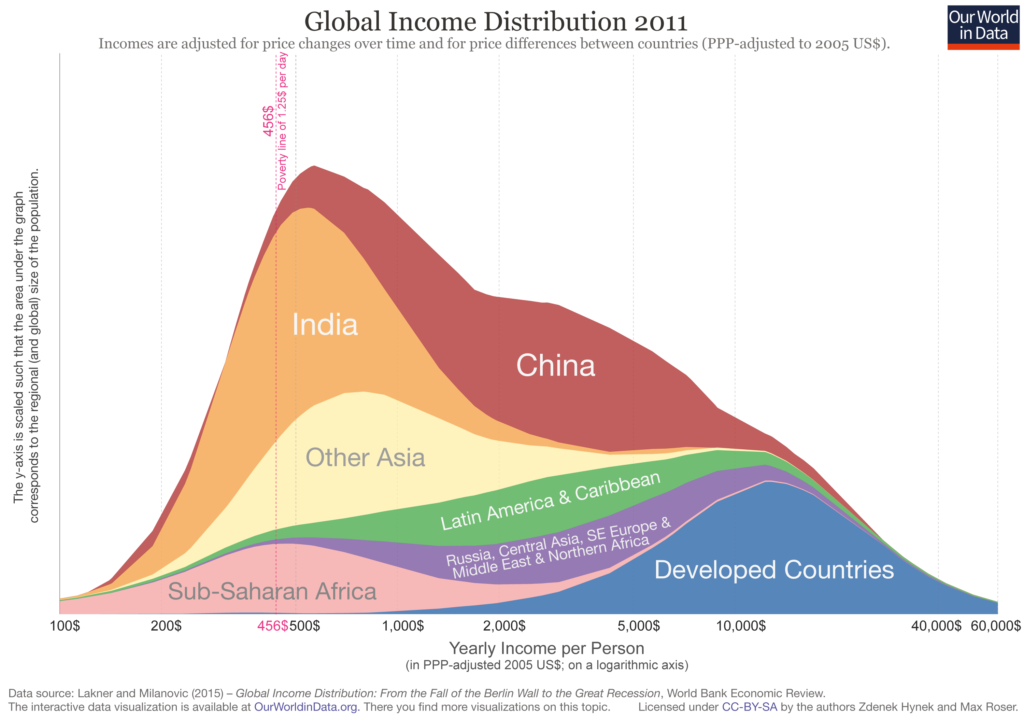Yesterday the Catholic Church celebrated the second annual “World Day of the Poor.” As Pope Francis has made helping the poor a centerpiece of his pontificate, he naturally addressed the topic in his homily during Mass. You can read the whole homily in the link provided, but I’d like to comment on one paragraph in particular, for it encapsulates what the pope gets right—and wrong—about poverty and wealth (Francis’s words in bold).
Let us ask for the grace to hear the cry of all those tossed by the waves of life. The cry of the poor: it is the stifled cry of the unborn, of starving children, of young people more used to the explosion of bombs than happy shouts of the playground. It is the cry of the elderly, cast off and abandoned to themselves. It is the cry of all those who face the storms of life without the presence of a friend. It is the cry of all those forced to flee their homes and native land for an uncertain future. It is the cry of entire peoples, deprived even of the great natural resources at their disposal.
Although the Holy Father gets criticized for overemphasizing the need to materially help the poor, it shouldn’t be forgotten that this is an essential requirement of being a follower of Christ. Our Lord made this clear in the parable of the Sheep and the Goats (Mt 25: 31-46), when he made our salvation dependent on how we help “the least of these.” I think it was Archbishop Chaput who said, “If we ignore the poor, we will go to hell.” This is a true—and frightening—statement. We are obligated to assist the poor in some way. So even if we think Pope Francis neglects spiritual matters at times in his focus on the material, we can’t do the opposite and neglect materially helping the poor.
I also appreciate who Francis includes in his list of the “poor.” Beyond the obvious groups we’d consider “poor” (such as starving children and those “cast off”), he mentions the unborn as well as children “more used to the explosion of bombs than happy shouts of the playground.” What is a greater poverty than living an existence in which your very life is constantly in danger? Yet that is the plight for many unborn children, as well as children living in war-torn areas such as the Middle East (who too often face U.S. bombs).
I know some might find controversial his inclusion of “all those forced to flee their homes and native land for an uncertain future,” but no matter your views on immigration policy, we must be sympathetic to the plight of those who live in such dismal conditions that they must sacrifice everything to leave it for a better life. How we can best help them can be debated, but we can’t debate that they are among the poor.
It is the cry of every Lazarus who weeps while the wealthy few feast on what, in justice, belongs to all. Injustice is the perverse root of poverty.
Here things get a little more problematic. What does Pope Francis mean when he says that “the wealthy few feast on what, in justice, belongs to all”? What exact resources are the wealthy feasting on? What does he mean that these resources “belong to all” in justice?
Unfortunately, based on a long history of comments by the Holy Father, it’s likely he’s advocating a system of forced redistribution of resources by governments, i.e., some form of socialism. Yet how would that forced redistribution not itself be an injustice? Although the pope only talks about a “wealthy few,” every system of redistribution always includes even those who are middle-class, even lower middle-class.
Let’s assume someone works an honest job to support his family. If he is a Christian, then I would argue that he is obligated to donate at least some portion of his wages to charity to help the poor. How much would depend on how much he makes and his legitimate obligations, but it should be something. Let’s say he doesn’t, though. What if a man with a gun came to his home, said, “Give me 30% of all your money – I’m going to use it to help the poor!” Would that be a just action? What if that person were wearing an IRS jacket? Does that make it just?
(If you question the analogy that an IRS agent would use force, try to not pay your taxes sometime and see what happens. You will eventually end up in jail, and if you refuse to go to jail, men with guns will come for you.)
Government redistribution of wealth faces many practical problems, in that governments are notoriously terrible at effectively distributing the funds. However, the main issue with government redistribution is a moral one, not a practical one, for it takes money by force from one person to give it to another. Pope Francis says that justice demands that the rich help the poor, and I don’t disagree with him that the rich should help the poor (I’d say that’s mercy, though, rather than justice). But it’s a core Catholic teaching that one cannot do evil that good may result—so why would it be okay to forcibly take money from some in order to help others?
The cry of the poor daily grows louder but is heard less and less. Every day that cry gets louder, but every day heard less, drowned out by the din of the rich few, who grow ever fewer and more rich.
Here Francis is simply incorrect to say that “the rich few…grow ever fewer.” The fact is that the past 200 years has seen a dramatic rise in material wealth. Further, that wealth has become better distributed over the past 30 years than ever before.
Let’s first look at historical world GDP (all data/charts from here). You can see in this chart that for almost all of human history, GDP had been essentially stagnant. Yet in the early 1800’s—which corresponds to the rise of the industrial age and capitalism—we witness a huge spike:
Now perhaps all the wealth is just concentrated with the “rich few,” as Pope Francis suggests? That’s not the case, as can clearly be seen from this chart tracking the share of the world population living in absolute poverty from the early 19th century to today:
Over 90% of the world was living in absolute poverty in 1820, but less than 10% do today. In other words, not only is the world getting more and more materially prosperous, that wealth is reaching everyone.
Finally, let’s focus just on the last 30 years and how income has been distributed across the globe. In this chart, we see global income distribution in 1988:
If it’s unclear, this chart is essentially saying that the non-developed world was dominated by very low-income workers. Now let’s look at the same chart in 2011:
It’s clear that income has become more and more distributed around the world. So when Pope Francis says that the wealthy are growing “fewer,” he’s simply mistaken. And when he says the wealthy are growing “more rich,” he’s correct, but that’s only because everyone is growing richer!
Pope Francis is correct to urge Christians to help the poor. However, many of his suggested solutions, which are often backed by inaccurate data, can be unjust and will often do more harm than good. There’s a two-fold means for Christians to help the poor: promote capitalism and perform charity.
First, advocate for policies that strengthen the free market. The rise of the free market (i.e., capitalism) corresponds directly to the rise of global wealth. Millions of people have been lifted out of poverty due to the free market. If we want to help the poor, we should push for structures that generate wealth for the poor.
Second, be involved in charity for the poor. No system will ever lift everyone out of poverty; the human condition is such that some will always face financial difficulties. In these situations, Christians need to reach out their hands to help those truly in need.
Unfortunately, Pope Francis appears to use his heart more than his head when he advocates bad solutions to help the poor. But if we are really serious about lifting people out of poverty, let’s use both our heads and our hearts to do all we can to make that a reality.





